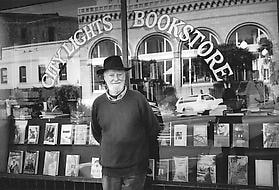
Lawrence Ferlinghetti in “Ferlinghetti.”
By DANIEL M. GOLD
Published: February 7, 2013
Most of his admirers consider the poet, publisher, activist and San Francisco eminence Lawrence Ferlinghetti one of the last major Beat Generation figures standing, but he doesn’t. “Don’t call me a Beat,” he warns in “Ferlinghetti: A Rebirth of Wonder.” “I never was a Beat poet.”
Perhaps not, but as Christopher Felver’s reverent documentary reminds us, he was not just present at the creation of the Beat Generation, he was also, as the publisher of Allen Ginsberg’s “Howl,” one of its midwives. Moreover, Mr. Ferlinghetti’s 1957 acquittal on obscenity charges stemming from the poem’s language (re-enacted in the 2010 film “Howl”) is credited with igniting the free-speech movement and the counterculture that followed.
That status may overshadow Mr. Ferlinghetti’s own literary prowess: the author of “A Coney Island of the Mind,” he remains among the most popular poets of the modern era.
The film traces his life from circumstances that Mr. Ferlinghetti, 93, genially recalls as “right out of Dickens”: born in Yonkers, he was effectively orphaned and lived with his Aunt Emily in France before moving to Bronxville, N.Y., where Emily was a governess for a wealthy family.
She abruptly ran off when Lawrence was 7, so the family raised him. After serving in the Navy in World War II, he found his way to San Francisco, where he became a founder of City Lights Bookstore in 1953. Indeed, as big a bouquet as the film is to Mr. Ferlinghetti, it is also a mash note to City Lights, a cultural touchstone and North Beach landmark.
Mr. Felver deftly blends old news clips and readings with interviews of writers and artists, among them Billy Collins and Dave Eggers, to define Mr. Ferlinghetti’s place in the pantheon of American letters. This biography is often effusive in its praise, but some lives and legacies were meant for a tribute.